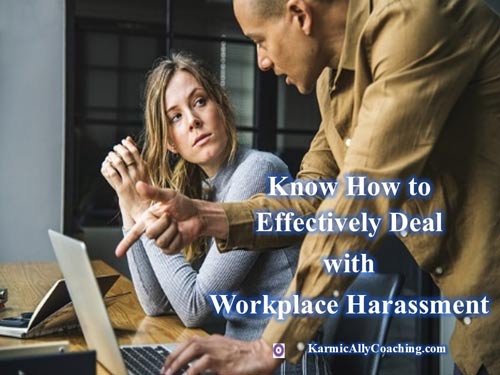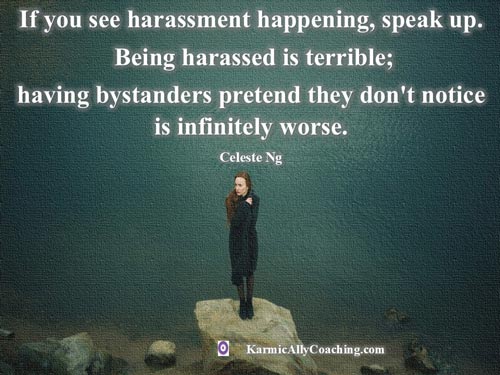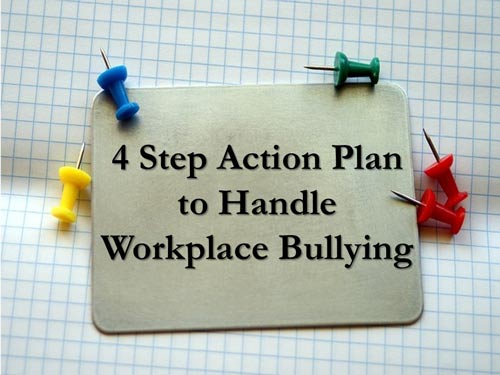This post has already been read 3023 times!

Everyone knows about sexual harassment in the workplace and the #MeToo Movement has brought it back into media attention.
But did you know there is something called non-sexual harassment that is equally bad for employee morale and mental health?
Workplace harassment according to Wikipedia is the belittling or threatening behavior directed at an individual worker or a group of workers.
In fact, under occupational health and safety laws around the world, workplace harassment and workplace bullying are identified as being core psycho-social hazards.
Harassment in the workplace has far-reaching impact on the health and well-being of the employee, as well as on their job stability and job satisfaction.
For legal purposes, workplace harassment is based on the victim’s national origin, age, religion, disability, sexual orientation, gender, or other characteristic that is protected by a country or states laws.
Workplace harassment in general refers to objectionable or unwelcome conduct, comments, or actions by an individual at any event or location related to work which can reasonably be expected to offend, intimidate, humiliate or degrade the other person.
It can take many forms ranging from being disrespectful, condescending and degrading to a targeted individual to more physical forms such as physical assault, sexual assault, bullying or even threat of harm.
Overbearing supervision, constant criticism, and blocking promotions are all considered workplace harassment.
Whichever form this harassment takes, the harasser often does so with the intention of making the victim feel uncomfortable.
Workplace harassment is not always between the opposite genders – even same sex workers can choose a victim of their own gender to focus their hostility or uncivil behaviour.
What’s important is how the victim feels. Sadly most cases of harassment or bullying are not reported until the time of the employee quitting their job and stating it in their exit interview.
Workplace bullying: Bulk typing of tax returns became an office issue
I experienced workplace bullying quite early in my career at the hands of a female Head of Department. To the outside world it appeared as if she was giving me work to do but there was more going on than met the eye.
It started out innocently enough. As the junior most employee in the firm, I often found myself with spare time on my hands between audits and kept busy doing small tasks for my supervisor.
One of them was typing the tax returns for our clients when the secretary went on leave. Simple for me since I had taken typing classes in the interim period between leaving school and joining University.
The Head of Department discovered I could type and asked if I could help her too. Of course my supervisor and I could not refuse her request but then I found a pile of typing on my desk every morning. This went on for a month and I could not do anything about it even though I resented it.
The Secretary had come back from her leave but the Head of Department insisted I do it because of my typing speed.
Things came to a head when I was getting ready to visit an audit site with my supervisor but was pulled back to do bulk typing.
Perhaps I was young and daring or the fact that I knew I was leaving for London in 3 months and would be free of this lady I decided to speak my piece.
The next day I walked into the Managing Partner’s office and told him I wanted to quit because I didn’t want to type!
I was so scared and intimidated by the Head of Department that this meeting went on for an hour with the Managing Partner slowly coaxing out the details from me. I told him the supervisor was not intervening and how I felt.
All this time, the Head of Department was walking up and down outside his office and this fact didn’t miss his eye.
I was frightened to leave his room and he poor man was stuck with a scared young woman.
The situation was resolved with his telling me to tidy up some papers for him while he went out for a client meeting. I was assured he would look into the matter but also given one of the first valuable bits of guidance in my career – to stand up for myself and refuse to do a task if it felt demeaning.
The next day the Head of Department was fired for creating a toxic work environment. Clearly she was good at her work but failed as a Leader.
My supervisor and another senior member invited me out for lunch that day and apologized for not protecting me.

As I learned later, the entire team had met up with the Managing Partner earlier and had offered to resign on the grounds of harassment.
The boss was still thinking of a resolution when I came in with my complaint and he took the only action possible to restore the workplace moral.
It was a tough call as this Head of Department was a valuable employee, but as a Leader, he did what he had to do.
5 Common Types of Workplace Harassment
Since then I’ve learned more about the different ways workplace harassment or bullying can happen. In addition to sexual harassment and quid pro quo harassment (sexual favors for a promotion or pay rise or even to avoid being fired) here are some that come to mind.
I’m sure there are other types out there too but these are the most common.
Discriminatory – All unlawful workplace harassment is discriminatory and is defined by its intention instead of how it is carried out. Examples include racial, gender, religious, disability-based, sexual-orientation and age based harassment.
Personal – This is more about bullying, intimidation and hostility and can cause emotional damage. Personal harassment includes personal humiliation, inappropriate or offensive jokes, ostracizing and even criticism.
Physical – Here physical violence or threats are made to the victim and in extreme cases even assault. If it makes the receiver uncomfortable to be touched, it comes under the radar of harassment.
Power – This is a common form of harassment where the harasser exercises their powers over the victim who is lower down the pecking order at work. This is exactly what happened to me with the mountains of typing in my earlier example.
Psychological – Here the victim is put down on a personal or professional level or even both impacting their sense of worth and self-esteem. It can include belittling the views or suggestions of the victim whether in private or in a meeting or even discrediting the victim openly to form a public opinion about the victim.
The Blurred Lines between friendly Office banter and Harassment
Sometimes the line between an office joke or banter and being made a victim of harassment become blurred. I suggest you consider how you feel in order to determine the difference and exercise your emotional intelligence.
A timely action can make a bigger difference to your workplace culture than you might realize.
Writing this blog post brought back memories of the time when a fellow Senior Manager called out to me as I was leaving the office to stay back as he wanted to drop me home that evening. It came as a surprise. I wondered if he was hitting on me or just being funny.
I saw his team looking at me intently for a reaction.
We had an open office floor plan and I could feel the pairs of eyes behind my back waiting for a response. As a new Manager in the office, I realized my next move would make or break my reputation.
I gave a witty repartee to the effect that if he could finish his work on time, I could give him a lift in my car because I preferred sitting behind the steering wheel.
The entire office exploded in laughter and I walked out.
But this remark kept bothering me on the drive home. Should I give him the benefit of the doubt or was there another insinuation?
I knew I had to nip it in the bud before it happened again.
The next day I made an appointment with the Partner he reported to and told him about what had happened.
Instead of lodging a complaint, I explained that such jokes could be misunderstood by the office staff and while I could laugh it off, a younger woman might create a scene or take matters to HR and this particular manager’s reputation could be sullied.
The Partner said he would look into it.
A week later, the Partner’s Executive Assistant told me that the Manager had been counselled by HR based on my complaint.
But he also told me something that shocked me. Mine was not the first time this had happened!
A few months earlier there was a woman Executive who had filed a complaint about this Manager’s insisting he drop her home during an audit she was working on and his getting aggressive when she declined. The matter had been resolved by transferring her to another audit team.
I guess the Manager had been given the benefit of doubt the first time but when I came along with my complaint presented as a suggestion, action was taken.
Was the Manager trying to be friendly and having it backfire? Was it sexual harassment or plain bullying based on Power or Psychological games? I leave it to you to figure out.
How to handle workplace bullying
My overarching recommendation whether you are facing harassment or not is to always read the Organization’s Code of Conduct and Policies as well as be aware of their procedures for reporting harassment.
You also need to handle the situation exercising Emotional Intelligence.

Here is a 4 step plan to handle the situation.
Step 1 – Identify the type of harassment you are facing
Is it sexual harassment or workplace-related harassment?
This clarification will determine how you should proceed.
The next 2 steps require being assertive.
Step 2 – You need to be assertive, demonstrate you have self-respect and confront the harasser
Similar to how I handled my co-worker, you need to be frank and firm and discourage such behaviour.
Keeping quiet and hoping things will change is not the solution as it encourages the harasser to continue with his or her behaviour. In other words, nip it in the bud.
This requires confronting the harasser and letting them know their behaviour is inappropriate in a calm manner and not in the form of an office scene. My tips on stun gunning the meanie will help here.
This step has 2 benefits. Firstly, if the harasser had not meant to upset you, it clears the air. Secondly, if the intention of the harasser is to make you feel uncomfortable, then this will serve as an adequate warning.
If the face to face discussion indicates the intent is not innocent, then document the details of the incident and the need to stop the behaviour on email to the harasser. This will serve as proof that you had already cautioned the harasser to cease and desist from his activity.
Normally at this stage things should resolve but if they don’t, then you need to prepare for intervention at a higher level.
Step 3 – Document the incident for Intervention
For this, first document the incident and get as many facts ready as possible. This will include the nature of the incident, witnesses to the incident, the time and place.
Management and HR will need to verify your complaint and also talk to the person being accused of harassing you before they can take action. Be specific and clear in your documentation and be ready to discuss your complaint with HR or any internal committee that your employer has to remedy such situations.
This is where the Code of Conduct and Office Policies are important as you can allude to them too.
The inquiry procedure can go on for some time so be prepared to be called in for more information.
Step 4 – Decide your next move
A good company will handle your complaint professionally and counsel both parties. Nobody likes to lose good employees.
If the results are not satisfactory or if you feel your complaint has not been handled properly, then it’s time to consider whether you really want to work in that organization.
Sometimes finding another job with a healthier workplace culture and environment is a solution.
Your exit should be done with dignity and grace. You would need a reference and burning bridges is not a good idea.
Consult a good lawyer conversant with the laws and regulations of your country on this matter for the next step you should take to ensure you aren’t victimized if you intend to leave the employer and make sure any agreement you sign with the employer doesn’t compromise your rights.
Have you ever experienced workplace harassment? How did you handle it?




 I adhere to the Certified Coaches Alliance Code of Ethics and Standards. A copy is available on request.
I adhere to the Certified Coaches Alliance Code of Ethics and Standards. A copy is available on request.
 Let's Talk through the Connect Form:
Let's Talk through the Connect Form:
Your steps to handle workplace bullying are excellent and defining the types of harassment is very helpful. Thank you!
Thank you Kelley!
I remember those days all too well. My way of handling it was to just look for another job. I don’t think I would do that now knowing what I do about my rights.
That’s what many professionals -women and men- do, Barb, because they want want out of a toxic workplace when in fact standing up to the bully should be the first line of defense. It’s partly because they aren’t aware of their workplace and occupational rights.
Wow. Been there. Done that. Didn’t get the same results. One of the corporate workplaces I remained employed at for too long had a toxic HR department. They protected the managers at all costs. If you did find the courage to stand up and report the bullying, inappropriate behavior and unfair practices, there was hell to pay! The head of the HR department would tell the managers about the conversations and who reported the issues. Let me tell ya, those who spoke to HR paid dearly (not just our department either). Eventually our manager was fired for other reasons. The organization still has a high turn over rate.
The insights you share are profound and helpful. May your words encourage other to empower themselves to do what is best for them. Thanks for all you do, Vatsala!
Thank you Cindy. That was a toxic environment and I am glad you left it behind. There are organizations where HR is ineffective and I’ve seen whistle blowers losing their jobs because they trusted the company policy. No wonder these organizations have a high attrition rate. Thanks for sharing your experience.
I love that you shard your personal story and it is inspirational to see how you stood up for yourself. I had an experience where my boss expected me to stay at work way beyond my scheduled work time and I finally stood up for myself and informed him I will be leaving on time every day. He didn’t speak t me for a few days but then got over it. It is so important we stand up for ourselves and get support in asserting our rights.
Thank God your boss was sensible to understand and accept that you weren’t obliged to work late every evening, Rachel. We need to stand up for ourselves.
Lots of great info here. This is such a mega problem. Thank you so much so posting this.
Glad you found it useful, Laura.